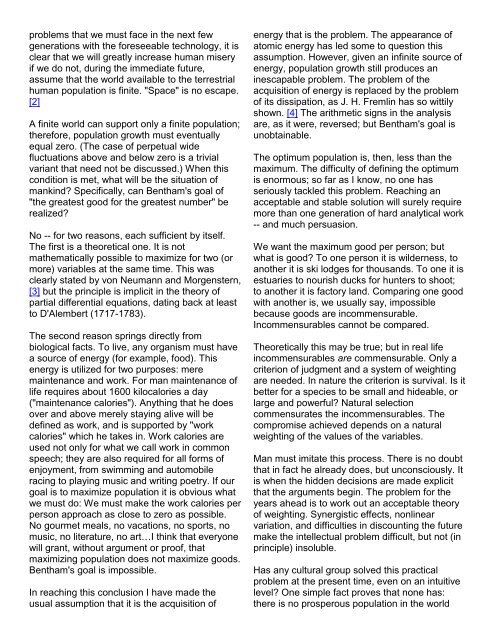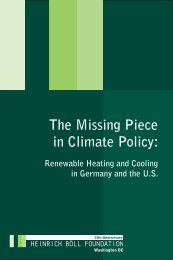The Tragedy of the Commons What Shall We Maximize?
The Tragedy of the Commons What Shall We Maximize?
The Tragedy of the Commons What Shall We Maximize?
You also want an ePaper? Increase the reach of your titles
YUMPU automatically turns print PDFs into web optimized ePapers that Google loves.
problems that we must face in <strong>the</strong> next fewgenerations with <strong>the</strong> foreseeable technology, it isclear that we will greatly increase human miseryif we do not, during <strong>the</strong> immediate future,assume that <strong>the</strong> world available to <strong>the</strong> terrestrialhuman population is finite. "Space" is no escape.[2]A finite world can support only a finite population;<strong>the</strong>refore, population growth must eventuallyequal zero. (<strong>The</strong> case <strong>of</strong> perpetual widefluctuations above and below zero is a trivialvariant that need not be discussed.) When thiscondition is met, what will be <strong>the</strong> situation <strong>of</strong>mankind? Specifically, can Bentham's goal <strong>of</strong>"<strong>the</strong> greatest good for <strong>the</strong> greatest number" berealized?No -- for two reasons, each sufficient by itself.<strong>The</strong> first is a <strong>the</strong>oretical one. It is notma<strong>the</strong>matically possible to maximize for two (ormore) variables at <strong>the</strong> same time. This wasclearly stated by von Neumann and Morgenstern,[3] but <strong>the</strong> principle is implicit in <strong>the</strong> <strong>the</strong>ory <strong>of</strong>partial differential equations, dating back at leastto D'Alembert (1717-1783).<strong>The</strong> second reason springs directly frombiological facts. To live, any organism must havea source <strong>of</strong> energy (for example, food). Thisenergy is utilized for two purposes: meremaintenance and work. For man maintenance <strong>of</strong>life requires about 1600 kilocalories a day("maintenance calories"). Anything that he doesover and above merely staying alive will bedefined as work, and is supported by "workcalories" which he takes in. Work calories areused not only for what we call work in commonspeech; <strong>the</strong>y are also required for all forms <strong>of</strong>enjoyment, from swimming and automobileracing to playing music and writing poetry. If ourgoal is to maximize population it is obvious whatwe must do: <strong>We</strong> must make <strong>the</strong> work calories perperson approach as close to zero as possible.No gourmet meals, no vacations, no sports, nomusic, no literature, no art…I think that everyonewill grant, without argument or pro<strong>of</strong>, thatmaximizing population does not maximize goods.Bentham's goal is impossible.In reaching this conclusion I have made <strong>the</strong>usual assumption that it is <strong>the</strong> acquisition <strong>of</strong>energy that is <strong>the</strong> problem. <strong>The</strong> appearance <strong>of</strong>atomic energy has led some to question thisassumption. However, given an infinite source <strong>of</strong>energy, population growth still produces aninescapable problem. <strong>The</strong> problem <strong>of</strong> <strong>the</strong>acquisition <strong>of</strong> energy is replaced by <strong>the</strong> problem<strong>of</strong> its dissipation, as J. H. Fremlin has so wittilyshown. [4] <strong>The</strong> arithmetic signs in <strong>the</strong> analysisare, as it were, reversed; but Bentham's goal isunobtainable.<strong>The</strong> optimum population is, <strong>the</strong>n, less than <strong>the</strong>maximum. <strong>The</strong> difficulty <strong>of</strong> defining <strong>the</strong> optimumis enormous; so far as I know, no one hasseriously tackled this problem. Reaching anacceptable and stable solution will surely requiremore than one generation <strong>of</strong> hard analytical work-- and much persuasion.<strong>We</strong> want <strong>the</strong> maximum good per person; butwhat is good? To one person it is wilderness, toano<strong>the</strong>r it is ski lodges for thousands. To one it isestuaries to nourish ducks for hunters to shoot;to ano<strong>the</strong>r it is factory land. Comparing one goodwith ano<strong>the</strong>r is, we usually say, impossiblebecause goods are incommensurable.Incommensurables cannot be compared.<strong>The</strong>oretically this may be true; but in real lifeincommensurables are commensurable. Only acriterion <strong>of</strong> judgment and a system <strong>of</strong> weightingare needed. In nature <strong>the</strong> criterion is survival. Is itbetter for a species to be small and hideable, orlarge and powerful? Natural selectioncommensurates <strong>the</strong> incommensurables. <strong>The</strong>compromise achieved depends on a naturalweighting <strong>of</strong> <strong>the</strong> values <strong>of</strong> <strong>the</strong> variables.Man must imitate this process. <strong>The</strong>re is no doubtthat in fact he already does, but unconsciously. Itis when <strong>the</strong> hidden decisions are made explicitthat <strong>the</strong> arguments begin. <strong>The</strong> problem for <strong>the</strong>years ahead is to work out an acceptable <strong>the</strong>ory<strong>of</strong> weighting. Synergistic effects, nonlinearvariation, and difficulties in discounting <strong>the</strong> futuremake <strong>the</strong> intellectual problem difficult, but not (inprinciple) insoluble.Has any cultural group solved this practicalproblem at <strong>the</strong> present time, even on an intuitivelevel? One simple fact proves that none has:<strong>the</strong>re is no prosperous population in <strong>the</strong> world






